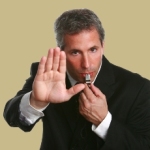Blowing a whistle is best done by little boys. As soon as you grow older and enter the real world of business, whistles are not something to play with anymore.

A whistle blower can be defined as a person who tells the public or someone in authority about alleged dishonest or illegal activities occurring in a government department or private company. The alleged misconduct may be classified in many ways; for example, a violation of a law, rule, regulation and/or a direct threat to public interest, such as fraud, health/safety violations, and corruption. Whistle blowers may make their allegations internally (for example, to other people within the accused company) or externally (to regulators, law enforcement agencies, to the media or to groups concerned with the issues). (Wikipedia)
If you have stumbled upon some gross wrong doing in your company, whether it is criminal or just unethical, you should think twice before reporting it. Many whistle blowers report there exists a widespread “shoot the messenger” mentality by corporations or government agencies accused of misconduct and in some cases whistle blowers have been subjected to criminal prosecution in reprisal for reporting wrongdoing. Whistle blowers can risk their livelihoods, their reputations, their lives and even the lives of their families to expose information of significant public importance, yet they do so at grave risk to themselves. Even in a country such as South Africa which has a more advanced whistle blowing law than most other countries, it does not bear testimony to the successful provision of a safe alternative to silence.
Good advice: turn a blind eye, cover your tracks and shut your mouth. Sadly it is never a good career move to blow a whistle. Rather give it to your pre-school son to play with.